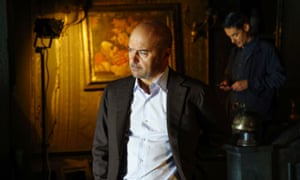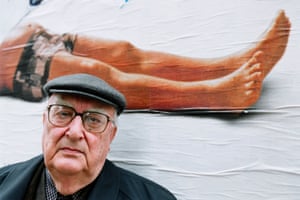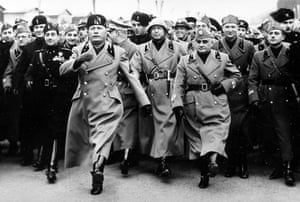 |
| Italian writer Andrea Camilleri in his house in Rome. Photograph: Fabrizio Villa |
'Italians go for the strongman': Montalbano author on fascism and the future
Andrea Camilleri, the novelist behind the much-loved Inspector Montalbano, has become a vocal critic of the Italian government
Lorenzo Tondo in Rome
Friday 5 April 2019
I
nspector Montalbano’s fate is already sealed, his end written 13 years ago by Sicilian novelist Andrea Camilleri, who created the character in the early 1990s. Since then he has become the most beloved Italian policeman in the world and the subject of a popular television series in the UK.
In 2006 the inspector’s “grand finale” was put in a drawer in the Palermo offices of Camilleri’s publisher for safekeeping. The content is, of course, top secret, but the date of publication of the grumpy detective’s last act is approaching.
Far from retreating from public life himself, his creator, now 93 and blind, has become one of the most outspoken critics among Italian intellectuals of the country’s rightwing populist coalition government, especially its anti-immigrant far-right interior minister, Matteo Salvini.
“Salvini reminds me of a member of the fascist regime”, says Camilleri in a rare interview at his home in Rome.
“He has the same fascist arrogance, the same smug representation of power,” he adds, his characteristic deep voice hovering somewhere between Tom Waits and the Tolkien wizard, Gandalf. “Like when he decided to close Italian ports to ships carrying migrants in the Mediterranean. I don’t believe in God, but if there’s a Judgment Day, those like him will certainly end up in hell for their hypocrisy”.
In a scene from an episode of Inspector Montalbano that aired in Italy in February, the detective delivered a pro-migrant message, angering supporters of Salvini. Montalbano jumps into the sea to recover the body of a migrant who drowned attempting to reach the shore. In another scene, he shouts to his colleagues: “Enough with the tale of Isis terrorists travelling on migrant boats.” The episode reached an audience of 11 million viewers and caused a heated controversy. While many supported the inspector, others attacked him. “Enough with the pro-migrant propaganda,” someone wrote on Twitter. The programme’s detractors should not have been surprised. Migrants have always been a central theme in Camilleri’s novels.
Last month, a merchant ship was hijacked by the same refugees and migrants that it had rescued off the coast of Libya. The captain was forced to steer towards Europe after the migrants and refugees realised they were being taken back to Tripoli, where they would have ended up in the hell of a detention centre.
“Salvini called it an act of piracy, but to me those migrants were only acting in self-defence,” says Camilleri, whose novels led to a boom in the number of British tourists heading for the parts of southern Sicily where the Montalbano books and TV dramas are set.
In recent years many Italian writers have expressed their disapproval of the government’s policies. The anti-mafia writer Roberto Saviano faces up to three years in prison after being summoned to stand trial on charges of libelling Salvini. Saviano, who has focused on connections between Salvini’s League party and Calabrian ‘Ndrangheta mafia groups, called Salvini the “minister of the criminal underworld”.
As far as organised crime is concerned, Camilleri says that in his novels mafia bosses are never protagonists and are almost always placed in secondary roles.
“Not because I fear them”, says Camilleri. “But I believe that writing about mafiosi often makes heroes out of them. I’m thinking of The Godfather, where Marlon Brando’s superb performance distracts us from the realisation that he also commissioned murders. And this is a gift that I have no intention offering to the mafia.”
If the mafia has a marginal role in Camillleri’s novels, fascism looms large. Camilleri, who was born in Porto Empedocle in Sicily in 1925, has often written about the impact of fascism on his life.
He cites as an example his participation in 1942 in an international conference of the fascist and Nazi youth chaired by the head of the Hitler Youth, Baldur von Schirach. Camilleri says that after having heard Von Schirach speak that day, he imagined a world “without his beloved Jewish writers whom Von Schirach labelled vile and degenerate. I began hoping that the Nazis would never win the war”. Camilleri subsequently fell into a deep existential crisis, and deteriorated physically. “I was totally consumed, and even worse I was living in a country dominated by fascists and could not tell anyone”.
Camilleri has often stated that the support for Salvini reminds him of the Mussolini era. He believes that there is an almost anthropological link between the fascism of the past and the rightwing populism of today, especially in big cities.
“In 1945, immediately following the Allied liberation, I read an article by the New York Times journalist Herbert Matthews,” Camilleri says. “It was titled ‘You haven’t killed him’”.
Matthews claimed that despite having hung Mussolini from his feet in Milan’s Piazzale Loreto, Italians had not freed themselves from fascism, which would continue to live on within them.
“That day I thought Matthews was an idiot,” says Camilleri, lighting his second cigarette. “Then a month and a half later six members of the Movimento Sociale Italiano [Italian Social Movement], a party founded by ex-members of the fascist regime, were elected to parliament. Then I thought Matthews was right and I was the idiot. You see, the truth is that Italians naturally go for the strongman. They like to put their fate in the hands of someone who will make decisions for them.”
As Inspector Montalbano – whose name, Camilleri reveals, pays homage to the Spanish writer Manuel Vázquez Montalbán – nears his end locked in a drawer in Palermo, Camilleri still has the same desire to discuss the unfolding of history as when he was a young man. He has not lost faith in humans, but he does believe that history is moving toward a grim future.
“The great Sicilian writer Leonardo Sciascia once told a story,” he says. “At the dawn of fascism, a man asked a blind peasant what the future held. The peasant quipped, ‘even if I’m blind, it all looks black’. Today I’m as blind as that peasant. And my answer would be the same.”





No comments:
Post a Comment